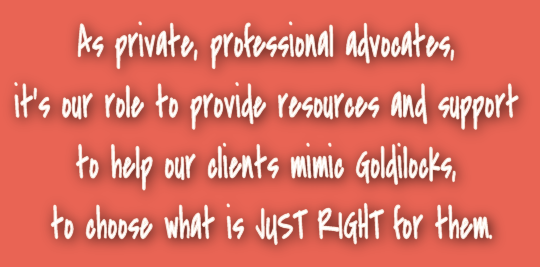OK – granted – I used that title to get your attention, but there’s a lesson here for all of us whether we use it for our clients, or for ourselves, or for a loved one — and that is — how to share information you have learned about symptoms, diagnosis, or treatment, without putting your provider on the defensive, or upsetting him / her.
Too often I hear people I know, or (worse) a health or patient advocate, say “I TOLD that doctor … (fill in the blank)”. Argh. It makes me cringe. Because such an approach will most definitely elicit the opposite response to what they intended.
We’ll begin by putting this shoe on the other foot….
Suppose you’ve been baking chocolate chip cookies all your adult life. These are cookies that are SO VERY EXCELLENT that you have developed a fine reputation for them. They are sought after for all the best bake sales. You are legend among your neighbors for showing up with a plate of cookies when family is coming in from out of town, or they are celebrating something big. YOU and DELICIOUS CHOCOLATE CHIP COOKIES have become synonymous in everyone’s mind.
You’re very proud (even if only secretly) of your fine chocolate chip cookie reputation. Not that you go around boasting about it – you wouldn’t do that. But you know that when it comes to chocolate chip cookies, you are da bomb.
Recently, new neighbors moved in across the street, a young couple with little children. It’s time to take some of your most excellent cookies to them as a welcome gift.
“Oh, thank you!” the young wife exclaims. Please come in! She offers one of your cookies to each of her children, one to her husband, and takes a bite of one herself. “You know – these are good. But you should put peanuts in them. I did that once and my family loved them.”
[Let’s pause to see how that statement feels to you….]
Are you angry? Insulted? Are you thinking, “Who the h*ll is this chick to tell ME how to make chocolate chip cookies!!! Doesn’t she realize how much more experience I have than she? She’s made them once! I have a longstanding track record! I’m famous for my chocolate chip cookes!”
You are all of the above: angry, insulted, and in the midst of trying to be polite, the rest of the conversation is now lost. You make a few minutes of small talk. You excuse yourself (“I’m sure you have so much unpacking to do!”) Mostly you’re ticked off, and all you want to do is exit the conversation. The impact of her comment will have a negative effect on your relationship for a long time to come.
Shifting gears back to the doctors we see….
We live in the days of Dr. Google where most of the information we need is available online. Whether for ourselves, a loved one, or a client, we research all the information we can about whatever medical circumstance necessary. As patients and advocates we are far more savvy than we ever were before, whether or not we have a clinical degree and experience.
As a result, we have much to discuss with the providers we work with. Appointments and edicts are no longer about “Mr. Jones, you have this, and THIS is what we are going to do about it.” Now they are (or at least they should be) a two way conversation of questions and answers, to include a discussion of alternatives. And Mr. Jones should be making his own decisions, not being told by the doctor what to do.
So how does this relate to chocolate chip cookies? To introduce to providers what we’ve learned online (or from any other resource), we should not be explaining. We should not be definite. We should not be TELLING.
Telling will put the provider on the defensive. He or she will probably be polite, but will internally be angry, frustrated, feeling second-guessed – no positive reactions for you or your client. Telling, when we hear between the lines, says “Yes, doctor, I know you’ve completed medical school and years of training, not to mention your decades of experience… But I spent an hour on the internet! So this is the answer….”
Yikes.
Instead we should be ASKING. Because asking begs collaboration.
Instead of “I went online and I think my symptoms point to Disease X”, the better approach is, “I read about Disease X which seemed to align with my symptoms. Have you ruled that out? Can you tell me why you chose Disease Z as my diagnosis instead?”
This approach respects the provider’s expertise and experience, yet invites a conversation.

This idea of ASKING instead of TELLING should be an integral part of every advocate’s skillset. It’s a classic and useful communications tool and a must-have for all professional advocates.
An “ask don’t tell” approach ultimately gives you far more information about possibilities, far more evidence for accuracy (or even inaccuracy), and alternate ideas on how to approach the needs and wishes of your client. With extra conversation and extra input, your client will be far more amenable to next steps, the ones he or she will choose, which might include obtaining additional medical opinions, seeking out clinical trials, or a host of other possibilities.
And just as important, it means that both current and future conversations with that same provider will be collaborative, cooperative, and satisfying. The provider will come away with more positive feelings about the conversation, setting the stage for more successful outcomes and better communications with both you or your client in the future.
Now, please pass those most delicious chocolate chip cookies. Can you tell me what makes them so special? What made you choose chips instead of chunks? Do you sift the flour? Dark or light brown sugar? Can you tell me why chocolate chip instead of snickerdoodles?
- Shooting Your Advocacy Practice in the Foot
- Twisted Words Put Me Off
- A Surefire Way to Drive Older Clients Away
LEARN ABOUT APHA MEMBERSHIP | REASONS PATIENTS NEED ADVOCATES | MASTER LIST OF PRACTICE RESOURCES






This is a great post! Not only for individual advocates but for all Advocates. Collectively we are building a reputation. Health professionals talk! If one has a bad experience word spreads affecting all of us.